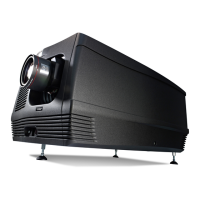27R5905752 /16 DP2K C
• This manual (installation manual).
• Safety manual
One xenon lamp is mounted inside the lamp house at delivery. The projector lenses are not
included in the package of the projector.
Mechanical check
This check should confirm that there are no broken knobs or connectors, that the cabinet and panel surfaces
are free of dents and scratches, and that the operating panel is not scratched or cracked. The Barco Sales
and Service office should be notified as soon as possible if this is not the case.
Tamper labels
During installation please inspect the tamper labels, if they are damaged please contact Barco tech support.
The tamper labels are required by DCI to provide easy visual indication if the equipment was tampered with.
The projectors are tested and labeled for shipping to ensure that the system was not compromised before
reaching the customers final destination.
These tamper labels can be found behind the input cover.
2.4 Installation process overview
Let the projector acclimate to the ambient temperature after unpacking. Neglecting this may result in
a startup failure of the light processor unit.
Set up from A to Z
After you have unpacked and checked the projector you can start with the installation process of your DP2K-
xxC. This chapter gives you an overview of all the different stages in the installation process which you have to
follow to set your DP2K-xxC up and running. Each stage is briefly described and refers to more detailed step
by step procedures in this manual. Use this overview as a checklist to ensure that you have followed all stages
in the setup process of your DP2K-xxC.
Set up from A to Z
1. Check if all installation requirements are fulfilled such as the environment conditions of the installation
area, capacity of the exhaust system, electrical facilities, etc. Note that a solid pedestal is required to
support the projector head. For more info see chapter “Installation requirements”, page 22.
Read also the information about hazard distance before starting the installation. For more info see topic
“High Brightness precautions: Hazard Distance”, page 17 and subsequent topics.
2. Physical installation of the projector upon its pedestal and connecting the air outlet of the projector with
the exhaust system. Note that the exhaust system is MANDATORY. See chapters “Physical installation”,
page 29, and “Installation of the exhaust system”, page 32.
3. Electrical connection with the power net. See chapter “Connecting the projector with the power net”,
page 33.
4. Installation of a suitable UPS unit or bypass the power in and outlet for the projector electronics. See
chapters “Connecting a UPS with the projector electronics”, page 37 or “Power loop through to the
projector electronics”, page 35.
5. Installation of the xenon lamp in case the xenon lamp is not installed in the lamp house yet. To install the
xenon lamp the lamp house has to be removed from the projector. To install the xenon lamp correctly and
in a safe manner, see the detailed step by step procedures in the chapter “Installation of the Xenon lamp”,
page 46.
6. Installation of the lens. First select an appropriate lens which throw ratio covers the screen size and the
projector - screen distance. Then install the lens in the lens holder of the projector. For more information
about available lenses, lens selection and lens installation see chapter “Lenses & lens holder”, page 57.
7. Installation of the Communicator Touch Panel. See chapter “Installing the touch panel interface”, page
117.
General

